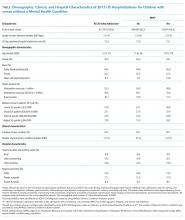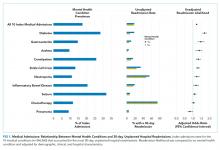Mental Health Conditions and Unplanned Hospital Readmissions in Children
OBJECTIVE: Mental health conditions (MHCs) are prevalent among hospitalized children and could influence the success of hospital discharge. We assessed the relationship between MHCs and 30-day readmissions.
METHODS: This retrospective, cross-sectional study of the 2013 Nationwide Readmissions Database included 512,997 hospitalizations of patients ages 3 to 21 years for the 10 medical and 10 procedure conditions with the highest number of 30-day readmissions. MHCs were identified by using the International Classification of Diseases, 9th Revision-Clinical Modification codes. We derived logistic regression models to measure the associations between MHC and 30-day, all-cause, unplanned readmissions, adjusting for demographic, clinical, and hospital characteristics.
RESULTS: An MHC was present in 17.5% of medical and 13.1% of procedure index hospitalizations. Readmission rates were 17.0% and 6.2% for medical and procedure hospitalizations, respectively. In the multivariable analysis, compared with hospitalizations with no MHC, hospitalizations with MHCs had higher odds of readmission for medical admissions (adjusted odds ratio [AOR], 1.23; 95% confidence interval [CI], 1.19-1.26] and procedure admissions (AOR, 1.24; 95% CI, 1.15-1.33). Three types of MHCs were associated with higher odds of readmission for both medical and procedure hospitalizations: depression (medical AOR, 1.57; 95% CI, 1.49-1.66; procedure AOR, 1.39; 95% CI, 1.17-1.65), substance abuse (medical AOR, 1.24; 95% CI, 1.18-1.30; procedure AOR, 1.26; 95% CI, 1.11-1.43), and multiple MHCs (medical AOR, 1.43; 95% CI, 1.37-1.50; procedure AOR, 1.26; 95% CI, 1.11-1.44).
CONCLUSIONS: MHCs are associated with a higher likelihood of hospital readmission in children admitted for medical conditions and procedures. Understanding the influence of MHCs on readmissions could guide strategic planning to reduce unplanned readmissions for children with cooccurring physical and mental health conditions.
© 2018 Society of Hospital Medicine
Main Outcome Measure
The primary study outcome was unplanned, all-cause readmission to any hospital within 30 days of index hospitalization. All-cause readmissions include any hospitalization for the same or different condition as the index admission, including conditions not eligible to be considered as index admissions (obstetric, psychiatric, and hospitalizations resulting in death or transfer). Planned readmissions, identified by using pediatric-specific measure specifications endorsed by AHRQ and the National Quality Forum,28 were excluded from measurement. For index admissions with multiple 30-day readmissions, only the first readmission was counted. Each readmission was treated as an index admission.
Main Independent Variable
The main independent variable was the presence of an MHC documented during the index hospitalization. MHCs were identified and classified into diagnosis categories derived from the AHRQ Chronic Condition Indicator system by using ICD-9-CM codes.29 MHC categories included anxiety disorders, attention-deficit/hyperactivity disorder (ADHD), autism, depression, and substance abuse. Less common MHCs included bipolar disorder, schizophrenia, disruptive behavior disorders, somatoform disorders, and eating disorders. These conditions are included in the group with any MHC, but we did not calculate the adjusted odds ratios (AORs) of readmission for these conditions. Children were identified as having multiple MHCs if they had more than 1 MHC.
Other Characteristics of Index Hospitalizations
A priori, we selected for analysis the known demographic, clinical, and hospital factors associated with the risk of readmission.20-24 The demographic characteristics included patient age, gender, payer category, urban or rural residence, and the median income quartile for a patient’s ZIP code. The hospital characteristics included location, ownership, and teaching hospital designation. The clinical characteristics included the number of chronic conditions30 and indicators for the presence of a complex chronic condition in each of 12 organ systems.31
Statistical Analysis
We calculated descriptive summary statistics for the characteristics of index hospitalizations. We compared characteristics in index admissions of children with versus without MHC by using Wilcoxon Rank-Sum tests for continuous variables and Wald χ2 tests for categorical variables. In the multivariable analysis, we derived logistic regression models to assess the relationship of 30-day hospital readmission with each type of MHC, adjusting for index admission demographic, hospital, and clinical characteristics. MHCs were modeled as binary indicator variables with the presence of any MHC, more than 1 MHC, or each of 5 MHC categories (anxiety disorders, ADHD, autism, depression, substance abuse) compared with no MHC. Four types of logistic regression models were derived (1) for the combined sample of all 10 index medical admissions with each MHC category versus no MHC as a primary predictor, (2) for each medical index admission with any MHC versus no MHC as the primary predictor, (3) for the combined sample of all 10 index procedure admissions with each MHC category versus no MHC as a primary predictor, and (4) for each procedure index admission with any MHC versus no MHC as the primary predictor. All analyses were weighted to achieve national estimates and clustered by hospital by using AHRQ-recommended survey procedures. SAS version 9.4 (SAS Institute, Cary, NC) was used for all analyses. All tests were two-sided, and a P < .05 was
considered statistically significant.
RESULTS
Study Population
Across all index admissions, 16.3% were for children with an MHC. Overall, children with MHCs were older and more likely to have a chronic30 or complex chronic31 physical health condition than children with no MHCs (Table).
Index Medical Admissions, Mental Health Conditions, and Hospital Readmission
The 10 index medical hospitalizations with the most readmissions for children ages 3 to 20 years were asthma, chemotherapy, constipation, diabetes, gastroenteritis, inflammatory bowel disease, neutropenia, pneumonia, seizure, and sickle cell crisis. Across all index medical hospitalizations, 17.5% were for patients with an MHC (Figure 1). Of index medical admissions with any MHC, 26.3% had ADHD, 22.9% had an anxiety disorder, 14.9% had autism, 18.3% had depression, and 30.9% had substance abuse. Among all admissions with MHCs, 28.9% had 2 or more MHCs.
Index Medical Admissions Combined
For all index medical hospitalizations combined, 17.0% (n = 59,138) had an unplanned, 30-day hospital readmission. The rate of 30-day hospital readmissions was higher with versus without an MHC (17.5 vs 16.8%; P < .001). In a multivariable analysis, presence of an MHC was associated with a higher likelihood of hospital readmission following an index medical admission (AOR, 1.23; 95% confidence interval [CI], 1.19-1.26); Figure 1). All MHCs except autism and ADHD had a higher likelihood of readmission (Figure 3).








